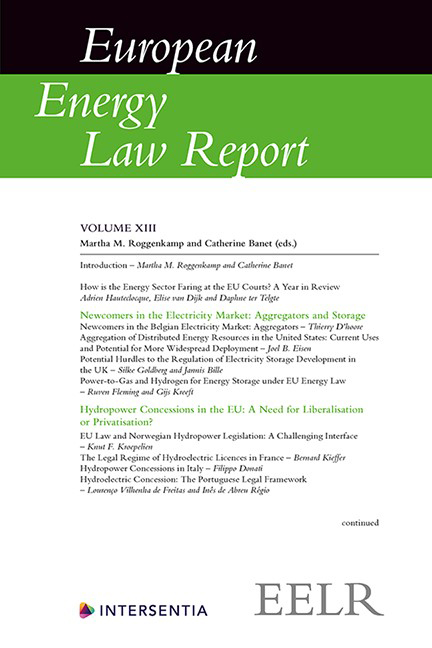Book contents
- Frontmatter
- Preface
- Contents
- List of Abbreviations
- List of Contributors
- Introduction
- Chapter I How is the Energy Sector Faring at the EU Courts? A Year in Review
- PART I NEWCOMERS IN THE ELECTRICITY MARKET: AGGREGATORS AND STORAGE
- PART II HYDROPOWER CONCESSIONS IN THE EU: A NEED FOR LIBERALISATION OR PRIVATISATION?
- PART III INVESTMENTS AND DISINVESTMENTS IN THE ENERGY SECTOR
- PART IV OFFSHORE DECOMMISSIONING IN THE NORTH SEA
- PART V CCS AS A CLIMATE TOOL: NORTH SEA PRACTICE
- PART VI FROM EU CLIMATE GOALS TO NATIONAL CLIMATE LAWS
Preface
Published online by Cambridge University Press: 30 April 2020
- Frontmatter
- Preface
- Contents
- List of Abbreviations
- List of Contributors
- Introduction
- Chapter I How is the Energy Sector Faring at the EU Courts? A Year in Review
- PART I NEWCOMERS IN THE ELECTRICITY MARKET: AGGREGATORS AND STORAGE
- PART II HYDROPOWER CONCESSIONS IN THE EU: A NEED FOR LIBERALISATION OR PRIVATISATION?
- PART III INVESTMENTS AND DISINVESTMENTS IN THE ENERGY SECTOR
- PART IV OFFSHORE DECOMMISSIONING IN THE NORTH SEA
- PART V CCS AS A CLIMATE TOOL: NORTH SEA PRACTICE
- PART VI FROM EU CLIMATE GOALS TO NATIONAL CLIMATE LAWS
Summary
The editors are very pleased to present the European Energy Law Report XIII. The European Energy Law Report is an initiative taken by the organisers of the European Energy Law Seminar which has taken place on a regular basis in the Netherlands since 1989. The aim of this seminar is to present an overview of the most important legal developments in the field of international, EU and national energy and climate law. Whereas the first seminars concentrated on the developments at European Community (EC) level, which were the results of the establishment of an Internal Energy Market, the focus has now gradually switched to the developments at the national level following the implementation of the EU Directives on the internal electricity and gas markets, promoting renewable energy sources, mitigating climate change and securing energy supply. This approach can also be found in these reports.
Similar to the previous European Energy Law Reports, this book includes chapters based on papers presented at the preceding European Energy Law Seminar, held on an annual basis. This Report, however, covers the main contents of the European Energy Law Seminars from both 2018 and 2019. It examines some new developments following from the liberalisation of the electricity market, the hydropower sector, investments in the energy sector and the increased role of flexibility, but also the other side of the coin – the gradual closure of coal-fired power plants and nuclear plants, as well as the decommissioning of offshore oil and gas facilities. The latter is again linked to the need to reduce carbon dioxide emissions, which notably rely on the use of carbon capture and storage (CCS) technologies, and the opportunity to re-use and re-purpose installations. Renewable energy generation and CCS are climate mitigation instruments to reduce CO2 emissions and are often considered in national climate plans and climate laws, which are examined in the last part of the book. This Report thus contains six parts: ‘Newcomers in the Electricity Market: Aggregators and Storage’, ‘Hydropower Concessions in the EU: A Need for Liberalisation or Privatisation?’, ‘Investments and Disinvestments in the Energy Sector’, ‘Offshore Decommissioning in the North Sea’, ‘CCS as a Climate Tool: North Sea Practice’ and ‘From EU Climate Goals to National Climate Laws’.
- Type
- Chapter
- Information
- European Energy Law Report XIII , pp. v - viPublisher: IntersentiaPrint publication year: 2020



